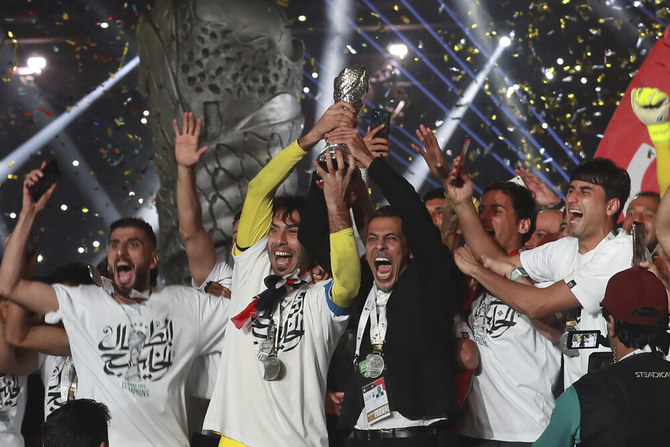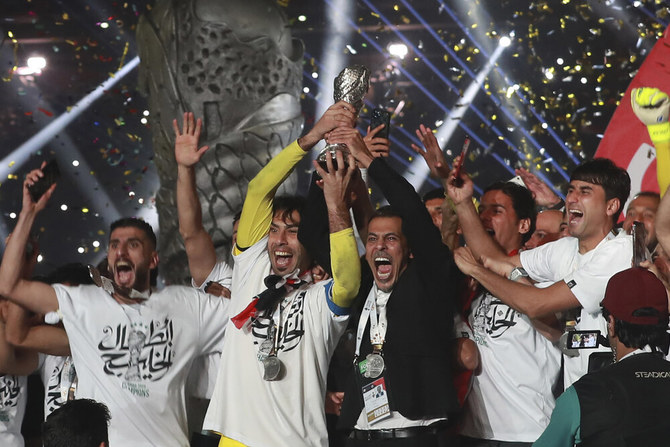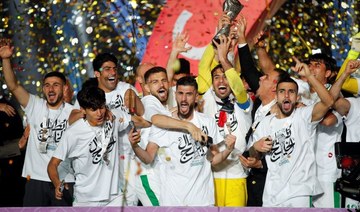BASRA: It was almost the perfect tournament for Iraq, a dream on and off the pitch. Perhaps it was too good to be true.
On Thursday night, as the nation prepared for the Arabian Gulf Cup final against Oman in Basra — a game Iraq eventually won 3-2 in sensational circumstances — reality crashed the party.
A crush outside the stadium, hours before kickoff, led to at least two people being killed and dozens more injured. Tragedy cast a shadow over the joyous celebrations, and who was to blame has yet to be determined.
It is a shame. Because while such an event cannot be ignored — and is not — Basra had put on a welcoming, sporting and culturally wonderful tournament up to that point.
After months of preparation and two weeks of intense football the 25th Arabian Gulf Cup came to an end with Iraq crowned champions.
Not only has the Iraqi national football team finally tasted international glory for the first time in 16 years, but the bigger victory was the Lions of Mesopotamia succeeding on home territory after decades of isolation and restrictions.
Being one of the most displaced populations because of war and sanctions, Iraqis across the globe have been celebrating the feat in Basra, which many felt they might never see in their home country.
Iraqis have made their homes in all parts of the world, with families often divided. But the Arabian Gulf Cup gave them something to celebrate. Even London’s Trafalgar Square filled with Iraqis minutes after Iraq’s victory.
“Witnessing Iraq host and win a tournament has brought much excitement and hope for the future of Iraqi football and has allowed us Iraqi expatriates to feel great pride in our heritage,” said Basim Amin, a 30-year-old Iraqi accountant living in Dubai.
“After growing up seeing Iraq suffer with years of war, it was hard to imagine Iraq hosting any sport.”
While the opportunity to celebrate Iraq’s reemergence on the international scene was cherished, many Iraqis were also disappointed at not being able to attend the tournament.
“Having had the amazing opportunity to be living in Qatar while the FIFA World Cup games took place, it made it even more heartbreaking that I wasn’t able to be a part of the Arabian Gulf Cup in my home country,” said Yasmin Jawad, a 31-year-old marketing specialist.
“To see a victory for our nation is something we could have only ever dreamed of and it’s such a proud day for all Iraqis.”
That sentiment was echoed by Shams Albayati, an Iraqi living in Vancouver.
“My heart was filled with joy and pride the last few days. Seeing how Iraqis united to make a transformative impact is a powerful message,” she said.
“It is proof that Iraqis will always have each other’s back to create Mesopotamian magic.”
Hassanane Balal, who lives in England and hosts an Iraqi football podcast, said staging an international tournament was a special moment for Iraq.
“I’m delighted that people back home had the opportunity to see their national team. It’s something that a lot of people take for granted.
“In England people can go and see their national team play whenever they want. In Iraq they don’t have that luxury,” he said.
“Overall, football is a huge factor in bringing Iraqis together. To have so many people turn up to these games shows you just how much football means to us.”
But that passion led to thousands of fans without tickets trying to get inside the ground for the final. And having not learned from the chaos outside the stadium ahead of the opening ceremony, the organizers’ poor crowd management cost lives.
“We shouldn’t just point fingers at Iraq,” said Jaffar Saraj, a property developer from London.
“What about the chaos that happened when Wembley hosted the Euro 2020 final?”
Aws Haidari, an Iraqi television producer in California, said he hoped the tragedy would prompt change.
“I am definitely happy to see Iraq host its neighbors and reunite with people and countries that we were separated from for decades,” he said.
“But I can’t help feel sad and worried that this tournament has glossed over the failure of the government to truly serve Iraqis desperate for tangible change.”
It was clear Iraq was able to host a quality tournament, Haidari said, but he wondered “if locals are deserving of that same enthusiasm when it comes to fighting corruption and supporting the dysfunctional health and education systems.”
With the tournament over, Iraqis can look back with pride and hope that it leaves a legacy for a population that has been through so much trauma. It will allow the children of Iraq to once again dream of being successful footballers and athletes, and show the rest of the world that Iraq is open to visitors.
Congratulations to Iraq, not only for success in football but also for a cultural victory.
Final day tragedy shouldn’t dampen Iraqi pride after Gulf Cup victory
Short Url
https://arab.news/24vkd
Final day tragedy shouldn’t dampen Iraqi pride after Gulf Cup victory

- Crush outside stadium cost two people their lives
- But sadness should not overshadow what until then had been a wonderful event













